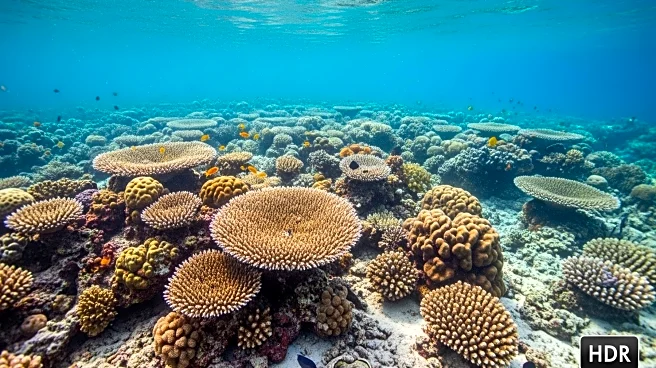What is the story about?
What's Happening?
A landmark report by 160 scientists has identified the widespread death of coral reefs as the first in a series of catastrophic climate tipping points. The report highlights that human activities, particularly the burning of fossil fuels, have driven temperatures to levels that risk triggering irreversible changes in Earth's crucial systems. Since 2023, coral reefs have been experiencing the worst mass bleaching event on record due to record high ocean temperatures, affecting over 80% of reefs globally. This transformation from vibrant ecosystems to bleached landscapes poses significant threats to marine biodiversity, food security, and the global economy. The report warns of further tipping points, including the potential collapse of the Atlantic Meridional Overturning Circulation, which could have severe global consequences.
Why It's Important?
The implications of reaching climate tipping points are profound, affecting not only environmental systems but also human societies and economies. Coral reefs play a critical role in marine ecosystems, supporting a vast array of species and contributing significantly to food security and economic activities. Their loss would disrupt these systems, leading to economic losses and increased vulnerability to coastal storms. The potential collapse of ocean currents like the AMOC could lead to drastic climate shifts, affecting weather patterns, sea levels, and global temperatures. The report underscores the urgency for decisive action to reduce greenhouse gas emissions and implement policies that can mitigate these impacts.
What's Next?
The report calls for immediate action to reduce planet-heating pollution and enhance carbon removal efforts. It emphasizes the need for governments to adapt policies to address abrupt and irreversible climate changes. The upcoming COP30 climate conference in Brazil presents an opportunity for countries to set ambitious emission reduction goals for the next decade. The report also highlights positive developments, such as the acceleration of solar power and electric vehicle adoption, which could help mitigate further warming.
Beyond the Headlines
The report suggests that current international agreements are insufficient to address the rapid and interconnected shifts in Earth's systems. It highlights the need for a paradigm shift in how climate policies are designed and implemented, focusing on resilience and adaptation to abrupt changes. The findings also point to the potential for technological advancements in clean energy to drive positive change, offering hope for a sustainable future.
















